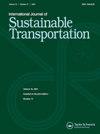Road freight privatization, technological progress, and transportation decarbonization: Perspective of platform logistics
IF 3.9
3区 工程技术
Q2 ENVIRONMENTAL STUDIES
International Journal of Sustainable Transportation
Pub Date : 2025-10-03
DOI:10.1080/15568318.2025.2521689
引用次数: 0
Abstract
Technology shapes organizations, and road freight privatization is considered an organizational change on a social level induced by platform logistics. Meanwhile, the consumer behavior of individual transporters as adopters of trucks may affect technological innovation, known as market-driven innovation. When road freight privatization and technological progress are incorporated into the STIRPAT model to examine their environmental sustainability implications, panel analysis shows that: (i) Road freight privatization reduced both TCE and CEI, which applies equally to light- and heavy-duty trucks. For medium-duty trucks, road freight privatization reduced CEI but had no significant effect on TCE. (ii) There was an inverted U-shaped relationship between technological progress and TCE/CEI, demonstrating a cyclical impact of technological progress on environmental quality. (iii) While road freight privatization interacted with technological progress to reduce both TCE and CEI, it interacted with transport energy structure to increase both TCE and CEI, suggesting that the vehicle purchase decisions of individual transporters are not biased toward electrification in the road freight sector. These results are inconsistent with the government’s assertion that individual transporters-led privatization undermines economies of scale.
公路货运民营化、技术进步与运输脱碳:基于平台物流的视角
技术塑造组织,公路货运私有化被认为是由平台物流引起的社会层面的组织变革。同时,个体运输商作为卡车采用者的消费行为可能会影响技术创新,即市场驱动型创新。当将公路货运私有化和技术进步纳入STIRPAT模式以审查其对环境可持续性的影响时,小组分析显示:(i)公路货运私有化减少了总成本和总成本,这同样适用于轻型和重型卡车。对于中型卡车,公路货运私有化降低了CEI,但对TCE没有显著影响。(二)技术进步与技术环境污染指数呈倒u型关系,表明技术进步对环境质量的周期性影响。(iii)虽然公路货运私有化与技术进步相互作用,降低了TCE和CEI,但它与运输能源结构相互作用,增加了TCE和CEI,这表明个体运输商的车辆购买决策并不偏向于公路货运部门的电气化。这些结果与政府的断言不一致,即个人运输公司主导的私有化会破坏规模经济。
本文章由计算机程序翻译,如有差异,请以英文原文为准。
求助全文
约1分钟内获得全文
求助全文
来源期刊
CiteScore
8.90
自引率
2.60%
发文量
56
期刊介绍:
The International Journal of Sustainable Transportation provides a discussion forum for the exchange of new and innovative ideas on sustainable transportation research in the context of environmental, economical, social, and engineering aspects, as well as current and future interactions of transportation systems and other urban subsystems. The scope includes the examination of overall sustainability of any transportation system, including its infrastructure, vehicle, operation, and maintenance; the integration of social science disciplines, engineering, and information technology with transportation; the understanding of the comparative aspects of different transportation systems from a global perspective; qualitative and quantitative transportation studies; and case studies, surveys, and expository papers in an international or local context. Equal emphasis is placed on the problems of sustainable transportation that are associated with passenger and freight transportation modes in both industrialized and non-industrialized areas. All submitted manuscripts are subject to initial evaluation by the Editors and, if found suitable for further consideration, to peer review by independent, anonymous expert reviewers. All peer review is single-blind. Submissions are made online via ScholarOne Manuscripts.

 求助内容:
求助内容: 应助结果提醒方式:
应助结果提醒方式:


